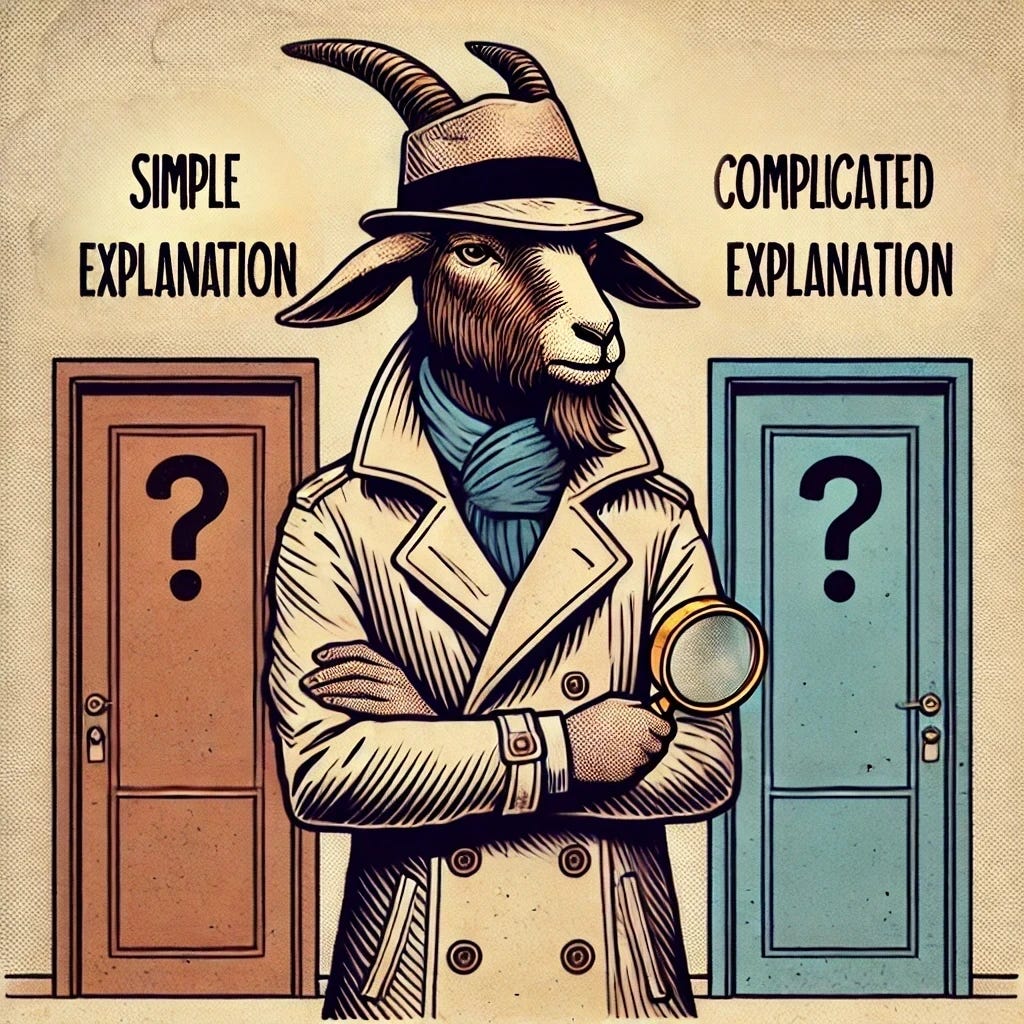Occam’s razor is often cited as a useful tool for thinking. Here’s how I described it a while back:
It might be more properly spelled Ockham’s Razor, since it was William of Ockham who eventually gave this name to the principle, albeit centuries after his death.
The concept goes like this: if there are two competing explanations for something, the one that is less complicated is more likely to be right. The razor idea came about to imply shaving away anything extra.
If you’re trying to figure out why or how something happened, you’re very likely to come up with several competing possible explanations. The idea is to consider how plausible each one is, which is sensible enough, but Ockham gives us a specific method for doing this every time.
While you have your detective hat on, you want to line up your competing possible explanations side-by-side in your mind. Whichever explanation requires the smallest number of things to be true? That’s your answer.
This answer isn’t always right, but it’s more likely to be right as a rule. If you’re choosing between a complicated explanation and a simple one, the simple one is right more often than not.
Is it more likely that Linda is a bank teller, or that she is a bank teller who is active in the feminist movement? Immediately, logic should give us the answer, especially if we know our good friend Occam’s trick. Funny things happen when you ask people this question, though.
One concept of intense study in physics that demands an explanation been that of entropy. In layperson’s terms, this describes the way there is more disorder in a system over time. In fact, that’s what the 2nd law of thermodynamics says, more or less.
Why should this be the case, though? Why should there be more disorder in a system over time? Why don’t eggs unscramble themselves, basically?
The second law describes entropy, a measure of the amount of disorder in a system. The short explanation here is that there are vastly more disordered states than ordered states in nature… the proverbial dice… roll over and over again, ending up with more disorder than order.
That’s a compelling reason as to why the 2nd law of thermodynamics should be a thing. Why should entropy increase over time, someone might ask? Because there are way, way more ways a system can be disordered than ways it can be ordered.
Ultimately, Occam’s razor is all about probabilistic thinking. The idea is to choose the explanation that requires the least complexity, making it a useful heuristic to save a lot of thinking time.
The 2nd law states that entropy increases because there are more possible disordered states than ordered ones.
Both ideas cut through the noise by using the same sort of reasoning. All things being equal, you’re more likely to see a disordered state in the future, and you’re more likely to find an explanation with fewer built-in assumptions to be correct.





"...way more ways a system can be disordered than ways it can be ordered...."
And probably even more than the 15 different ways John Tanner of the The Five Royales boasted he could get to his girlfriend's house on their record "Right Around The Corner" (Double meanings in R&B song lyrics personify Ockham and the Razor perfectly).
I frequently think about Entropy when I’m scrambling eggs. Also packing. Takes an hour to pick the things you need for a week away from your own bed, stuff it all in a little box. Get to your hotel, boom! 5 minutes to unpack. My standard entropy viz to is our ever expanding universe. Imagine playing your Uno reverse card and getting all that stuff back in the big bang box